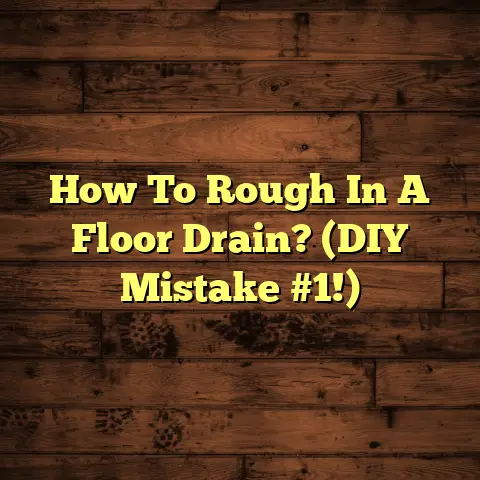How Often To Clean Carpets? (7-Day Germ Alert!)
We often think about cleaning our kitchens and bathrooms, but what about our carpets? They’re silent sponges, soaking up everything from dirt and dust to allergens and germs.
And that’s why maintaining clean carpets is so crucial for a healthy home or workplace. It’s not just about aesthetics. It’s about air quality and overall well-being.
In this article, I’m going to share my expert insights. And the insights I’ve gathered from other pros on how often you should really be cleaning your carpets. We’ll dive into the “7-Day Germ Alert” and how to keep your carpets fresh and germ-free. Let’s get started!
Section 1: Expert Picks on Carpet Cleaning Frequency
Over the years, I’ve chatted with countless professionals about carpet cleaning. From seasoned carpet cleaners to health experts and even interior designers. Everyone has a slightly different take, but there are some common threads.
-
Professional Carpet Cleaners: Most pros I know recommend a deep clean. Think steam cleaning or hot water extraction, every 12-18 months. For high-traffic areas or homes with pets, they suggest bumping that up to every 6-12 months.
-
Health Professionals: Doctors and allergists often emphasize the importance of frequent vacuuming. Especially for those with allergies or asthma. They often recommend vacuuming 2-3 times per week with a HEPA filter vacuum. Some even suggest professional cleaning every 3-6 months for allergy sufferers.
-
Interior Designers: Designers tend to focus on maintaining the carpet’s appearance. They often advise spot cleaning spills immediately and using preventative measures like rugs and mats in high-traffic areas. They also recommend professional cleaning every 12-24 months to keep carpets looking their best.
So, what’s the magic number? It really depends on your household. A single person in a low-traffic apartment can get away with less frequent cleaning than a family with kids and pets in a busy home.
Expert Cleaning Method Picks:
-
Steam Cleaning (Hot Water Extraction): This is the gold standard for deep cleaning. It uses hot water and powerful suction to remove dirt and grime. Pros often recommend this method. Especially for heavily soiled carpets.
-
Dry Cleaning: This method uses chemical solvents to clean carpets with minimal moisture. It’s a good option for delicate carpets or those prone to shrinkage.
-
Shampooing: This involves applying a detergent-based shampoo to the carpet and then extracting it with a vacuum. While effective, it can leave behind residue if not done properly.
I recall a study by the EPA that found indoor air quality can be significantly improved by regular carpet cleaning. Especially when using methods that remove allergens and pollutants.
Section 2: The 7-Day Germ Alert
Okay, let’s talk about the “7-Day Germ Alert.” What’s that, you ask? Well, it’s my way of highlighting how quickly bacteria and allergens can accumulate in your carpets.
Think about it: you walk all over your carpets every day. Tracking in dirt, dust, pollen, and who knows what else. Pets add their own layer of dander and potential accidents.
Over time, these contaminants build up, creating a breeding ground for germs. Studies have shown that carpets can harbor bacteria like E. coli, Salmonella, and Staphylococcus. Yikes!
And it’s not just bacteria. Carpets can also trap allergens like dust mites, pet dander, and mold spores. These allergens can trigger allergies and asthma symptoms, making life miserable for sensitive individuals.
So, why the 7-day timeframe? Well, research suggests that bacteria can double in number every 20 minutes under the right conditions. Allergens can also accumulate rapidly, especially in high-traffic areas.
That’s why I recommend a thorough vacuuming at least once a week. Especially in areas where you spend a lot of time or where pets and children play. This helps remove surface dirt and allergens before they have a chance to multiply.
Of course, vacuuming is just the first step. For a truly deep clean, you’ll need to consider professional cleaning or DIY methods like steam cleaning.
Section 3: Factors Influencing Carpet Cleaning Frequency
Now, let’s dive into the specific factors that influence how often you should be cleaning your carpets.
-
Traffic Levels: This is a big one. A busy household with lots of foot traffic will need more frequent cleaning than a quiet apartment. Think about it: more people means more dirt, more spills, and more wear and tear.
-
Pets: Oh, pets! We love them, but they can be tough on carpets. Pet dander is a major allergen, and accidents happen. If you have pets, you’ll need to vacuum more often and consider professional cleaning every 6-12 months.
-
Allergies & Health Concerns: If you or someone in your household has allergies or respiratory issues, carpet cleaning is even more critical. Regular vacuuming and professional cleaning can help remove allergens and improve indoor air quality.
-
Climate & Environment: Your local climate can also play a role. Humid climates can promote mold growth in carpets, requiring more frequent cleaning. Dry climates may lead to more dust accumulation, also necessitating more vacuuming.
I once worked on a house near the beach. The carpets were constantly filled with sand and moisture. We recommended cleaning that carpet every three months!
Section 4: Signs Your Carpets Need Cleaning
How do you know when your carpets are due for a cleaning? Here are some telltale signs:
-
Visible Stains: Obvious, right? But even small stains can attract more dirt and grime over time.
-
Odors: If your carpets smell musty, stale, or just plain funky, it’s time for a cleaning.
-
Changes in Texture or Appearance: If your carpets look dull, matted, or worn, a good cleaning can often restore their appearance.
-
Increased Allergies or Respiratory Issues: If you notice an increase in allergy symptoms or breathing problems, your carpets may be to blame.
-
The “Walk Test”: Walk barefoot on your carpet. If your feet feel gritty or dirty afterward, it’s time to clean.
Regular inspections are key. Take a close look at your carpets every few weeks. Pay attention to high-traffic areas and spots where spills are likely to occur.
Don’t wait until your carpets are visibly dirty to clean them. Preventative maintenance is always easier (and cheaper) than dealing with a major mess.
Section 5: Best Practices for Carpet Maintenance
Okay, let’s talk about how to keep your carpets in tip-top shape. Here’s my recommended daily, weekly, and monthly routine:
-
Daily: Spot clean spills immediately. The faster you act, the better your chances of removing the stain completely. Use a clean cloth and a mild cleaning solution. Blot, don’t rub, the stain.
-
Weekly: Vacuum thoroughly. Pay attention to high-traffic areas, edges, and corners. Use a vacuum with a HEPA filter to trap allergens.
-
Monthly: Deep clean high-traffic areas. You can use a DIY steam cleaner or hire a professional. This will help remove embedded dirt and grime.
Choosing the Right Cleaning Products and Tools:
-
Vacuum: Invest in a good quality vacuum with strong suction and a HEPA filter.
-
Spot Cleaner: Choose a spot cleaner that’s designed for your carpet type. Test it in an inconspicuous area first to ensure it doesn’t damage the fibers.
-
Steam Cleaner: If you’re going the DIY route, rent or buy a steam cleaner. Follow the manufacturer’s instructions carefully.
DIY Carpet Cleaning Methods:
-
Baking Soda: Sprinkle baking soda on your carpet, let it sit for 30 minutes, and then vacuum it up. This helps absorb odors and freshen the carpet.
-
Vinegar: Mix equal parts white vinegar and water in a spray bottle. Spray the solution on stains, let it sit for a few minutes, and then blot it up with a clean cloth.
-
DIY Carpet Cleaning Solution: Mix 1/4 cup white vinegar, 1/4 cup baking soda, and a few drops of dish soap in a bucket of warm water. Use a sponge or brush to apply the solution to the carpet, let it sit for a few minutes, and then rinse with clean water.
Section 6: Professional vs. DIY Carpet Cleaning
So, should you hire a professional or tackle carpet cleaning yourself? Here’s a breakdown of the pros and cons:
Professional Carpet Cleaning:
-
Pros:
- More powerful equipment and cleaning solutions
- Expertise in handling different carpet types and stains
- Convenience and time-saving
- Can extend the life of your carpets
-
Cons:
- Higher cost
- Requires scheduling and preparation
- Potential for chemical residue if not done properly
DIY Carpet Cleaning:
-
Pros:
- Lower cost
- Convenience and flexibility
- Control over cleaning products used
-
Cons:
- Less powerful equipment
- Risk of damaging carpets if not done properly
- Time-consuming
When to Call in the Pros:
- Stubborn stains: If you’ve tried everything and can’t remove a stain, it’s time to call a professional.
- Large areas: Cleaning an entire house full of carpets can be a daunting task. A professional can get the job done quickly and efficiently.
- Specialty carpets: If you have delicate or expensive carpets, it’s best to leave the cleaning to the pros.
- Allergies or respiratory issues: Professionals have the equipment and expertise to remove allergens and improve indoor air quality.
What to Expect from Professional Cleaning Services:
- Pre-inspection: The technician will inspect your carpets to identify any problem areas.
- Pre-treatment: They may apply a pre-treatment solution to loosen dirt and grime.
- Cleaning: They’ll use a hot water extraction or dry cleaning method to clean your carpets.
- Post-treatment: They may apply a stain protector or deodorizer.
- Drying: Your carpets will need time to dry after cleaning. The technician will provide instructions on how to speed up the drying process.
Choosing a Reputable Company:
- Read reviews: Check online reviews to see what other customers have to say.
- Get multiple quotes: Compare prices and services from different companies.
- Ask about experience and certifications: Make sure the company is experienced and certified by a reputable organization.
- Inquire about their cleaning methods and products: Ensure they use safe and effective methods and products.
Conclusion
So, how often should you clean your carpets? As you can see, there’s no one-size-fits-all answer. It depends on your lifestyle, your household, and your personal preferences.
But here’s the bottom line: regular carpet cleaning is essential for a healthy home. By following the tips and recommendations I’ve shared in this article, you can keep your carpets clean, fresh, and free from harmful germs and allergens.
Remember the “7-Day Germ Alert!” Vacuum at least once a week, spot clean spills immediately, and consider professional cleaning every 6-18 months.
Call to Action
Now it’s your turn. Take a look at your carpets. Assess your cleaning habits. Are you doing enough to keep your carpets clean and healthy?
If not, it’s time to make a change. Implement the expert advice I’ve shared today. Your carpets (and your health) will thank you for it!
And remember, I’m always here to help. If you have any questions or need advice on carpet cleaning, don’t hesitate to reach out. Happy cleaning!





